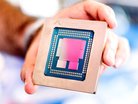Amazon's Bold Ambition to Grow its AI Chip-Manufacturing

Amazon, the retail giant best known for its e-commerce empire and cloud computing services is seeking to expand its chip manufacturing.
This strategic move comes as NVIDIA experiences a slump in sales, creating space for competitors amid their ongoing market dominance.
Amazon seeks to gain superior control over its technology infrastructure, reduce third-party supplier dependency and optimise its services for efficiency, innovation and cost.
At the core of Amazon's chip manufacturing is Amazon Web Services (AWS), which has been working to enhance its cloud offerings and the development of its machine learning chips.
Chips with the Cloud and AI at the centre
AWS has developed its Graviton processors, chips which are optimised for cloud workloads and offer significant increases of performance-per-watt compared to traditional x86 processors.
These chips are designed in-house and based off ARM architecture, utilising custom-designed silicon to enhance the efficiency of AWS's cloud offerings at a competitive price.
Amazon has also been focusing on AI-specific chips, like Inferentia and Tranium.
These chips are designed for AI training workloads and inference, designed to accelerate machine leaning tasks and enhance the scalability of enterprise AI.
In both these instances, Amazon reduces its reliance on external suppliers like AMD and Intel, strengthens its supply chain resilience and gains the flexibility to innovate rapidly.
By owning the end-to-end optimisation and design of these chips, AWS ensures seamless cloud platform integration, making the process of AI adoption smoother and higher performance for existing customers.
This helps position AWS as a leader in cloud based AI services, an area the company is also developing through the expansion of its manufacturing facilities.
Expanding manufacturing facilities & focus on AI
Amazon has been investing in research and development facilities and recruiting top semiconductor engineering talent to further enhance its chip manufacturing.
The company has expanded its global footprint, building teams focused on silicon design in Austin, Texas and Silicon Valley.
It's pursed collaboration with manufacturing partners like the Taiwan Semiconductor Manufacturing Company to fabricate and enhance its custom chips.
While Amazon focuses on design and innovation, TSMC leads on production with its established semiconductor foundries.
This focus on innovation has led the company to collaborate with and invest in Anthropic, the growing AI leader responsible for the AI Claude.
Last September Anthropic named AWS its primary cloud provider, as AWS made a US$4bn investment in the company.
This aligned with the rapid adoption of the Claude family of AI models on AWS, following its addition to Amazon Bedrock in April of last year.
More recently Anthropic named AWS its primary training partner, in addition to its primary cloud provider, announcing its intent to use AWS Trainium and Inferentia chips to train and deploy its future foundation models.
This partnership helps further the manufacturing innovation of AWS's chips, as the technology is tested by Anthropic.
"The response from AWS customers who are developing generative AI applications powered by Anthropic in Amazon Bedrock has been remarkable," comments Matt Garman, AWS CEO.
"By continuing to deploy Anthropic models in Amazon Bedrock and collaborating with Anthropic on the development of our custom Trainium chips, we’ll keep pushing the boundaries of what customers can achieve with generative AI technologies.
"We’ve been impressed by Anthropic’s pace of innovation and commitment to responsible development of generative AI - and look forward to deepening our collaboration."
"This has been a year of breakout growth for Claude and our collaboration with Amazon has been instrumental in bringing Claude's capabilities to millions of end users across tens of thousands of customers on Amazon Bedrock," adds Dario Amodei, Co-Founder and CEO of Anthropic.
"We’re looking forward to working with Amazon to train and power our most advanced AI models using AWS Trainium and helping to unlock the full potential of their technology."
Implications for the industry
Amazon's expansion into chip manufacturing disrupts the traditional dynamics of the cloud computing and semiconductor industries.
It challenges NVIDIA's significant market dominance, creating opportunities for further innovation as competition increases.
Amazon will also drive innovation through how its differentiating itself from competitors like Google Cloud and Microsoft Azure- by vertically integrating is silicon design capabilities.
This puts pressure on traditional chip manufacturers like AMD and Intel, due to the growing prioritisation of custom silicon over off-the-shelf processors.
Amazon's advances could influence the markets of edge computing and Internet of Things, where efficient and specialised processors are in high demand.
As the demand for specialized chips grows across industries, Amazon’s investments in chip manufacturing and silicon design are poised to yield substantial dividends.
Explore the latest edition of Manufacturing Digital and be part of the conversation at our global conference series, Manufacturing LIVE.
Discover all our upcoming events and secure your tickets today.
Manufacturing Digital is a BizClik brand.


